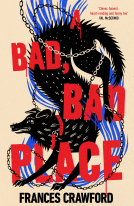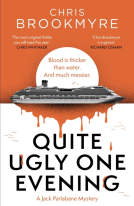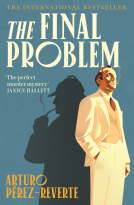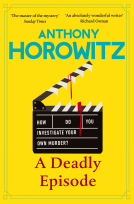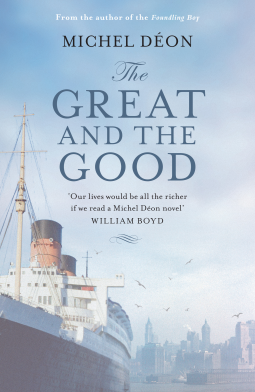
The Great and the Good
by Michel Déon
This title was previously available on NetGalley and is now archived.
Send NetGalley books directly to your Kindle or Kindle app
1
To read on a Kindle or Kindle app, please add kindle@netgalley.com as an approved email address to receive files in your Amazon account. Click here for step-by-step instructions.
2
Also find your Kindle email address within your Amazon account, and enter it here.
Pub Date 27 Dec 2016 | Archive Date 13 Feb 2017
Description
From the acclaimed author of The Foundling Boy, The Great and the Good is a 1950s American classic about a tranformative journey by sea.
'Slyly funny, yet still touching' The Sunday Times
Arthur Morgan is aboard the Queen Mary bound for the United States, where a scholarship at an Ivy League university awaits him, along with the promise of a glittering future.
But the few days spent on the ship will have a defining effect on the young Frenchman, when he encounters the love of his life.
A Note From the Publisher
$14.95 USD
Advance Praise
From the acclaimed author of The Foundling Boy comes this new classic set in 1950s America.
Available Editions
| EDITION | Other Format |
| ISBN | 9781910477281 |
| PRICE | $14.95 (USD) |
| PAGES | 232 |
Average rating from 9 members
Featured Reviews
 Leslie G, Book Trade Professional
Leslie G, Book Trade Professional
I have to admit I could not put this book down after what seemed to me a conventional start - I was soon persuaded of the unique character of the threesome Arthur meets on the boat to AMerica. Augusta, fascinating to all men, and her friend the enticing Elizabeth and the kingpin, the brother who marshals Augusta through a high flying life on gambling and a legacy of tragedy in Brazil. Their unusual relationships are completely plausible and fascinating and teh long trip onthe ocean liner that makes up a good portion of the book is exciting and presages big things for Arthur who is moving among the great and the good, his poor mother's phrase for the life she hopes he will lead. Very persuasive and intelligent with broad cultural confidence and reach - even an important novel in its way. I understand from reseraching a bit that Deon is a highly respected fiction writer in his home country, and I can very well see why. We travel from Europe to the US and back, to high personages in education and in politics in both places. Enchanting too .. Really impressive
 Sue B, Reviewer
Sue B, Reviewer
Review copy courtesy of Gallic Books/NetGalley, many thanks.
Arthur emerges from a newly-liberated but financially depressed France to continue his studies in a prestigious New England university, at great cost to his mother and bearing the burden of her hopes for his brilliant future amongst ‘the great and the good’ of the American elite. The story hinges on just how great and how good they (and Arthur) turn out to be. On the voyage over the Atlantic on the Queen Mary, he meets several people who will have a profound effect on his life for the next 20 years. 1950s New York comes alive and I found the characters and the relationships between them engaging, and hoped for happy endings.
This is not a book to skip through quickly - dense and intimate, there are passages to savour. Great writing and the translation flows seamlessly. I had noticed the Gallic Press publications of Déon’s Foundling Boy and Foundling’s War earlier but at the time felt saturated with novels about WWII and overlooked them. On the strength of this book, they are now at the top of my ‘to read’ list.
 emma c, Reviewer
emma c, Reviewer
VERDICT: A coming of age story, where the great may not be good enough to give sense to your life. So currently relevant.
I rejoiced at the possibility of reading Michel Déon, a very famous and popular French author, not even remembering if I had read him in French decades ago. He passed away at the age of 97, just as I was starting to read The Great and the Good, his latest book translated into English!
The book (which has no numbered chapters) comprises an inclusion, the first and last pages of the book pertaining to the situation of the French main hero, Arthur, when the author writes his novel. In between, we have his story, mostly what happened to him around 20 years earlier.
In 1955, as he was 22, he went to the US on board The Queen Mary to study commercial law in an American university, on a Fulbright scholarship. Not unlike the author himself – you can watch this great interview, in English, about his own experience and his book.
Arthur is from a rather poor milieu. His mother, proud of him, kept sacrificing to allow him to join “la cour des grands”, as we say in French. Originally, it’s an expression used in grade school, where you traditionally find a schoolyard for younger graders and another yard for “les grands”, older graders.
This has actually been translated here as “The Great and the Good”, losing the first origin of the expression. “With the big boys” or something similar would have kept closer to the idea.
On the boat, Arthur starts getting a flavor and introduction to the totally new to him milieu of the great and the rich, when he meets one of the teachers of the university he’s going to; and also Elizabeth, and her Brazilian friends, Augusta and her brother Getulio. The last two have known some tragedy in their childhood, and they cope with it in very different ways.
Arthur meets also on the boat President Eisenhower’s special adviser.
All these people are different, with all kinds of eccentricities that make them attractive to Arthur. Money is extremely important for all of them, and in their frivolity, they don’t mind shocking people. Definitely not the type of people Arthur is used to, but he will also fall under their charm, especially through the two women.
It was fascinating to see Arthur little by little getting enchanted by them and by this world of a few elect, though like a butterfly near by the fire, at the risk of his life, and how he ended up changed and forever wounded. Even though he eventually more than succeeded financially, thanks to his profession in “Wall Street jungle”. Emotionally and humanly though, he becomes a wreck.
If the teacher is a wreck through alcoholism, Getulio through gambling, Augusta through antidepressants and her brother’s unhealthy relationship with her, Arthur is by losing his own identity and sense of time and succumbing to a passion he knows cannot be real for long. He ends up with two faces, neither of one being his true self.
The world would never be his world. But where was his world?
…his arbitrary allocation of lived time having been frozen and there being no longer either present or past in anything that concerned him personally
I really enjoyed the description of the characters with their unicity, their asset and weaknesses. And the way loneliness is evoked, in its different facets.
There were also great scenes on the enclosed life aboard a major ocean liner.
There are here and there interesting or sometimes humorous reflections on general issues:
A country has to look after its poets, or at least… if not its poets – that divine gift is unevenly distributed and a number of civilizations have fallen so far behind that they will never catch up – at least, if not the poets, then its pleasure-seekers, who enjoy life to the full and without thought of tomorrow.
He has, in the space of a few minutes, realized that this country, so often described to him as a paradise, is also the anteroom of a hell devised by human beings
– at his arrival in the US.
I am not familiar with the book in its original version, but it did seem nicely translated.
There was just a weird sudden change from the third to the first person narrative, for a short period, which didn’t make too much sense and was actually confusing. But I assume it is also the case in French.
Even though the book has some themes in common with The Catcher in the Rye, I enjoyed it much more, possibly because I have been reading it in the current situation, when it is essential to remind ourselves that if we remain at a superficial level, with no inner depth, our lives can only end in despair. Money and power will not fulfill our lives.
 Rony C, Reviewer
Rony C, Reviewer
Being obsessive and losing focus on the real things that are important in life.
Twenty-two-year-old Arthur Morgan (a Frenchman) has been given a Fulbright Scholarship to study Commercial Law at Beresford University in the United States. His mother manages to scrape enough money together to pay for him to sail to the States, first class, on the Queen Mary. Thanks to this very generous present, Arthur meets and befriends people who will have a profound effect on both his career and the friends he makes at university.
Three people who will make the most impact on him are Augusta and her brother Getulio Mendosa and Elizabeth Murphy. He meets them on the first day of the voyage and falls instantly in love with Augusta. Her beauty and fragile manner captivates him. However, Getulio has other ideas for his sister and her future. He wants her to marry someone who he deems suitable (with loads of money!) He forbids them having a relationship, meaning that all their meetings become clandestine.
I mentioned to a friend that I’d found the book irritating and she suggested that I needed to look at my own feelings to find what had sparked the grumpiness it seemed to stir inside me. I’ve taken longer to think about the storyline and consequently my review. What I discovered about myself was interesting.
Arthur is a beautiful sensitive character who works hard to obtain his degree thanks to the scholarship. He’s sensible, presentable and hugely popular with both his class mates but also with his lecturers. Instead of realising and accepting his future and relishing how his life changes thanks to this scholarship, his unfulfilling love for Augusta, blocks any other thoughts or feelings he might have developed for anyone else.
Elizabeth is the only other character who I felt had any spunk. She has a huge personality and is determined to make it in the world as both an actress and a producer. Unfortunately, Arthur never gives her the love and respect she deserves because of his blinkered thoughts that only focus on Augusta. This obsession really got under my skin and I’ll have to give it further thought as to why it did cause me so much irritation. Was it because I myself had at some stage had an obsessive love for someone? Or because I wanted to take him and shake him?
Another irritation was the method the author has used to write the book. It’s all a series of long paragraphs with none of those breaks that I like to find in a book: reaching the end of a chapter! There weren’t any, which meant that I had none of my usual discipline (when reading in bed) to get to the end of the chapter before switching off my brain for the night. I don’t think I’ve ever come across a book written in this manner and therefore found it quite disturbing for my somewhat OCD behaviour.
Considering how much I disliked the format, the obsessive love, some of the characters, why four stars? Well, this is thanks to my friend making me truly analyse my emotions that came to the surface thanks to this book.
Treebeard
Breakaway Reviewers received a copy of the book to review.
